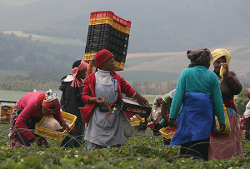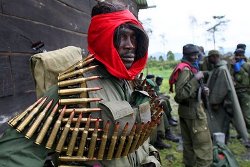


An Interview with Leang Seckon, Cambodian Freedom Artist
Source: Truthout
Leang Seckon, one of Cambodia’s foremost contemporary artists, will see his first European solo exhibition, The Heavy Skirt, opening March 31 at London’s Rossi & Rossi gallery. Unlike depictions of his homeland that you might come across in the US, Seckon’s work presents a rich and complex view of Cambodia, involving elements of performance, collage, painting and illustration. But it can be confusing, like speaking with the artist himself.
"A problem is me, not perfect English," Seckon tells me when I turn on my tape recorder. But I disagree: The problem is how rarely we take the time to listen.

South Africa: Labor Market Shuts Out Women
Not only do women experience a higher rate of unemployment compared to men, but women also make up about two of every three discouraged work seekers. The recent economic crisis has also disproportionately affected women, with the number of females who are no longer economically active rising sharply between 2008 and 2009.

Africa: The Role of Natural Resources in Civil Wars
A 23 year old Congolese woman told Human Rights Watch that the soldiers "raped us and dragged us to their camp which was not far away. I stayed there for one month, under constant supervision. Even when I went to fetch water, he came with me to ensure that I did not run away.... There was no conversation between us, he had sex with me at any moment, when he felt like it, and with a lot of violence. I spent my days crying. I begged God to free me from this hell." Stories of this nature are not unusual in the DRC.


Honduras: The Return of the Death Squads
Source: In These Times
TEGUCIGALPA, HONDURAS-Late in the afternoon on February 3, Vanessa Zepeda, a 28-year-old registered nurse, left a union hall after a meeting and began walking to the supermarket to buy school supplies for her children and formula for her baby girl.
She never made it.
According to witnesses, as she was leaving the union hall parking lot in this sprawling capital city, Zepeda was forced into an unmarked white sedan by two masked men dressed in fatigues.
A few hours after she was kidnapped, her corpse, still dressed in blue hospital scrubs, was tossed from a moving car in the Loarque neighborhood on the southern side of the city-a well-known stronghold of the resistance movement.
